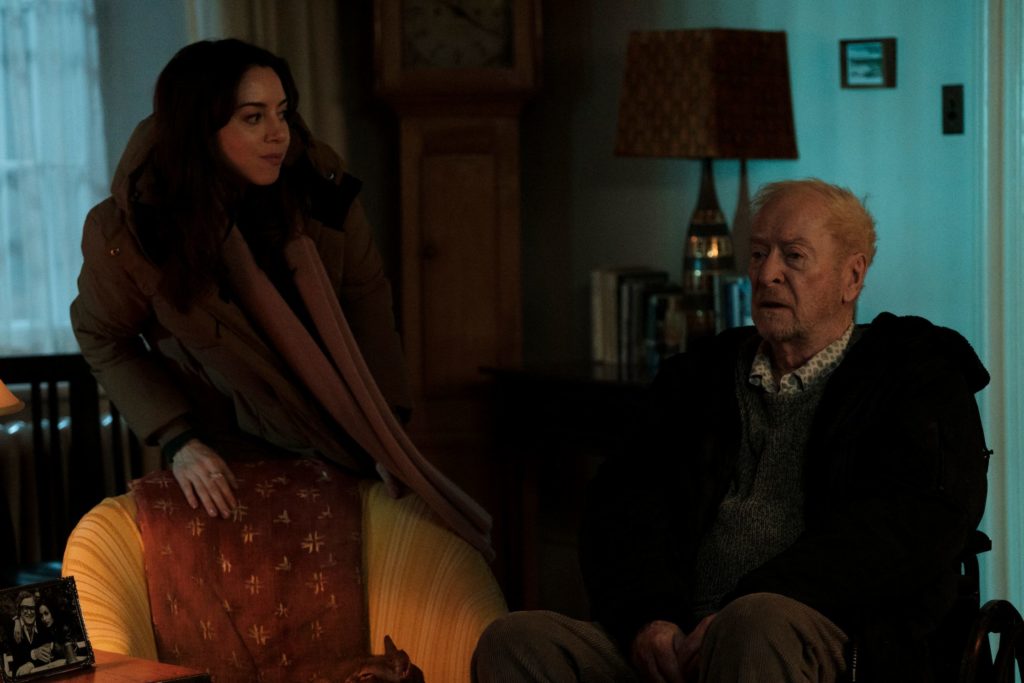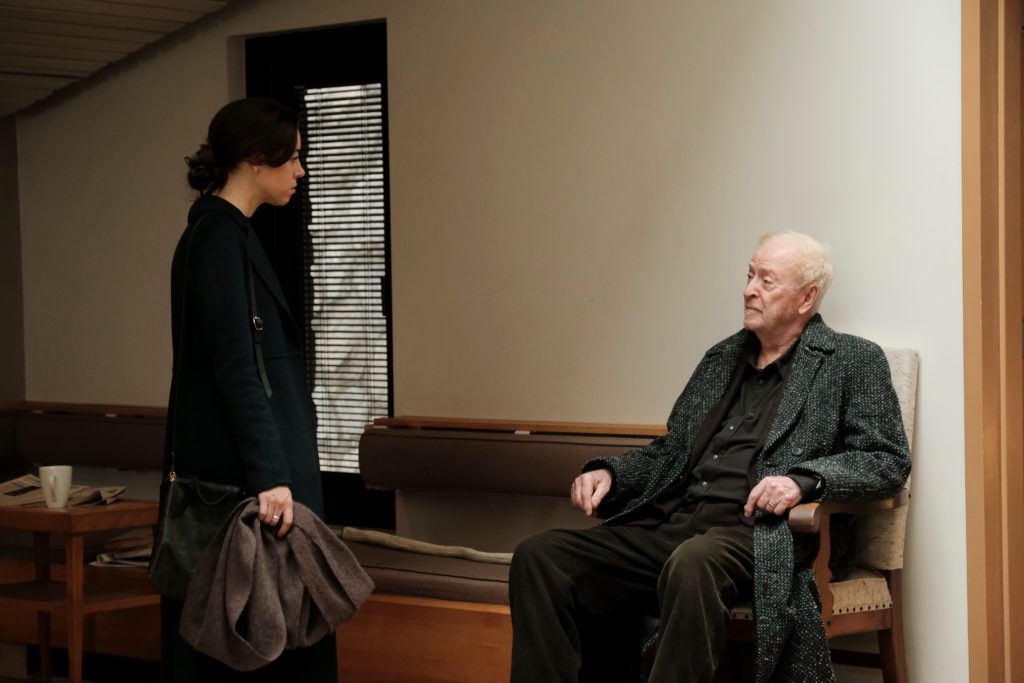Read also:
How to Watch FX Live Without CableHow To Watch AMC Without CableHow to Watch ABC Without CableHow to Watch Paramount Network Without CableMichael Caine & Aubrey Plaza give far more effort than this saccharine comedy-drama about generation gaps, the publishing industry & social media deserves.
There’s a certain reaction one has when watching a movie that opens with the Chicken Soup for the Soul logo, and that is a labored sigh. The company that made its fortune publishing collections of inspiring true stories about overcoming adversity and beating the odds quietly moved into the movie producing business some years back. You’d be forgiven if up to this point you hadn’t heard of anything they produced–the vast majority of their projects seemed to have been created specifically for the direct to streaming market, with titles like 12 Dogs of Christmas and Paris Countdown. After a recent deal with Redbox, however, they’re looking to move into more prestige fare, starting with the comedy-drama Best Sellers.
And, well…perhaps they should stick with stuff like Elliot the Littlest Reindeer.
The first question you might ask is “Why does this movie have six production company vanity cards?” That question is never answered. The second question is “What is Aubrey Plaza doing here?” That answer is “Giving it her all.” Plaza and her co-star Michael Caine are the only things that save this limp effort, treating the material with far more seriousness and enthusiasm than it deserves. If even a fraction of the work they put into their performances went into writing a script that didn’t feel like a hastily sewn together collection of jokes, tired satire, predictable twists, and unearned sentiment, it’d be a genuinely good movie.
Plaza is Lucy Stanbridge, a workaholic struggling to keep her father’s once-successful publishing company afloat. She seems to be running the place entirely on her own, acting as publisher/agent/editor and marketing rep, with only her fretful assistant (Ellen Wong) to help, and an oil painting of her father looming over everything. Despite ever-waning sales and bad reviews, Lucy is determined to keep the publishing house open, fending off the advances, both business and romantic, of an obnoxious competitor (Scott Speedman) who wants to buy her out. It’s unclear why Lucy feels that simply selling or merging the company is more humiliating than running it into the ground, and herself into insolvency. That’s one of many things the viewer will simply have to accept without question, though, in order to go along with what Best Sellers is trying to say.

Rather than seek out exciting new talent, Lucy discovers that one of her father’s star authors, Harris Shaw (Caine), after writing one best selling book almost fifty years ago, still owes the publishing company a follow-up. Lucy seeks out Harris, who (a) is still alive, and (b) just happens to have a completed manuscript ready and waiting to be published. On one condition, agreed to in his original contract — not a single thing in it can be edited, not even so much as a comma moved. In return, he’ll agree to whatever publicity needs to be done for it. Lucy agrees, and without even so much as skimming it, sends Harris’s book to press for widespread distribution.
Now, in order to fully enjoy most movies, the viewer must engage in a little something called “suspension of disbelief,” in the understanding that, though they may look like they take place in the real world, it’s really a sort of alternate universe. So it is with deep regret that I say I could not get past this aspect of the plot, even though it’s what nearly the entire movie hinges on. No publishing house that hopes to stay in business and not get hit with a bunch of lawsuits would ever (ever!) publish a book unedited, let alone without even looking at it. It’s a simply laughable suggestion, and one that makes Lucy actually seem like the amateur relying on nepotism that her competitors claim she is, when the audience is supposed to know that she’s much smarter than that. Even Stephen King has an editor, whom he thanks in his books right along with his wife and children, because that’s how important an editor’s job is in the publishing industry.
That’s not the only indicator that screenwriter Anthony Grieco doesn’t really understand how the publishing industry works (even though he’s trying to satirize it), just the most glaring. There’s also the extremely tired “brilliant but troubled writer” cliches formed into the vague shape of a man that is Harris Shaw. Is he a drunk? Yes, sir. Is he an irascible asshole? Oh, the worst! Does he seem to actually hate the process of writing? With a burning passion. If you’re also going to guess reclusive, has cats, has a heavy secret weighing on his shoulders, and still relies on a typewriter, well, congratulations, my friend, that’s a bingo. The manuscript he hands Lucy even has a coffee cup ring prominently placed on the cover page. That Grieco spent so little time attempting to make Harris into an original character is almost impressive. That Caine puts so much effort into giving him some life is commendable, but also feels like a disconcerting waste of time for an actor who’s pushing ninety years old.
ANYWAY, Lucy and Harris go on a road trip (because of course they do) trying to promote Harris’s book. Rather than reading from the book as he’s supposed to, though, Harris instead goes on booze-soaked tangents about the state of the world, describing everything as “bullshite.” His audiences, rather than walk away in disgust, eat this up, and of course his tangents “go viral,” because, the movie posits, people today are dumb and only have the attention span required to read a #hashtag rather than a full-length book. It also suggests that the reason Lucy’s publishing company is failing is because she pivoted to mostly YA literature, in real life one of the genres that’s keeping the book publishing industry alive. Like I said, Anthony Grieco doesn’t actually seem to know much about the world in which his movie takes place.

While people keep showing up at Harris’s appearances, they aren’t actually buying his book. As Lucy scrambles to try to save her company, she and Harris gradually warm up to each other, as we learn the truth behind why she refuses to throw in the towel, and why he’s been a miserable recluse all these years. You can probably guess why that is, and that as soon as they get it all out suddenly they feel a lot better, and their priorities immediately change, and it becomes the uplifting, feel-good, very empty movie we were threatened with as soon as that Chicken Soup for the Soul logo popped up at the beginning.
Despite its reliance on “this weird modern world” tropes about social media (which in and of themselves are starting to feel stale), there’s something about the core story of Best Sellers that feels like it was written thirty years ago. Even the upbeat score occasionally feels like it was lifted from an 80s direct to HBO workplace comedy. The neurotic, overachieving Lucy, who’s spent her entire life in her father’s shadow, is a character who comes off like she was originally written to be played by a man, especially when she’s smoking cigars and threatening people with a shotgun. Then of course, there’s Harris, who exists in a netherworld, tethered to no real time or place. When your characters are so generically written that they could be played by any actor, of any gender, and any age, that’s a problem, and the problem lies squarely, again, with the dreadful screenplay, directed with competence (but no real flair) by Canadian actor Lina Roessler.
Let me just reiterate: Plaza and Caine are both quite good in Best Sellers. So good, in fact, that it makes me angry that they weren’t given a better movie. You can often see just how old Caine is now, with most of his time on screen spent either sitting or laying down, and the work he puts into this dull, derivative nonsense is hardly worth the end result. I hope that Sir Michael has many more years with us, and I hope he spends those remaining years getting scripts that are more worthy of the time he has left.
Best Sellers is now playing in theaters and available on demand.